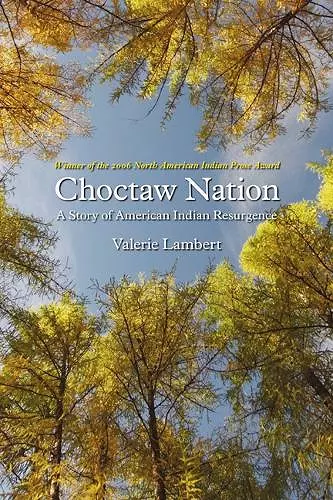Choctaw Nation
A Story of American Indian Resurgence
Format:Paperback
Publisher:University of Nebraska Press
Published:20th Mar '09
Currently unavailable, and unfortunately no date known when it will be back

Tells the story of tribal nation building in the modern era. Drawing on field research, oral histories, and archival sources, Valerie Lambert explores the struggles and triumphs of the Choctaw building a new government and launching an ambitious program of economic development in the late twentieth century, achieving a partial restoration of the tribe's former glory.Choctaw Nation is a story of tribal nation building in the modern era. Valerie Lambert treats nation-building projects as nothing new to the Choctaws of southeastern Oklahoma, who have responded to a number of hard-hitting assaults on Choctaw sovereignty and nationhood by rebuilding their tribal nation. Drawing on field research, oral histories, and archival sources, Lambert explores the struggles and triumphs of a tribe building a new government and launching an ambitious program of economic development in the late twentieth century, achieving a partial restoration of the tribe’s former glory as a significant political and economic presence in what is now the United States. An enrolled citizen of the Choctaw Nation who was reared in Oklahoma, Lambert describes in vivid detail what this nation building has meant for the Choctaw people and for non-Indians. Choctaw nation building has strengthened the tribe’s ongoing efforts to defend their sovereignty and protect their rights to land, water, and other natural resources. It has also helped produce new ways of imagining, constructing, and expressing Choctaw identity. Yet, as Choctaw Nation also shows, Choctaw sovereignty—the bedrock of Choctaw empowerment—remains under threat, as tribal sovereignty is not only a bundle of inherent rights but also an ongoing, complex consequence of Native initiatives and negotiations on local, state, and national levels. In addition to wrestling with the topics of sovereignty, identity, tribal nationalism, and contemporary tribal governance, this book gives considerable ethnographic attention to tribal elections, non-Indians, urban Indians, economic development, and tribal water rights.
"[A] thorough study, one grounded in current anthropological theory but surprisingly free of the discipline's wordy jargon... [A] good book that tackles some complex issues ... [and] has value beyond its obvious purpose of describing the growth of the modern Choctaw Nation. There are, it seems, lessons here for other tribal groups that may be seeking greater autonomy or that are trying to escape from the ravages of allotment and termination."-The Chronicles of Oklahoma -- Paul H. Carlson The Chronicles of Oklahoma "The story of Choctaw reconfiguration is both unique to specific circumstances and emblematic of experiences of modern nation building elsewhere in Indian country."-Choice -- Choice Choice "As Lambert tracks between her outsider perspective as an anthropologist and her insider's view as a Choctaw, readers are privileged to a clear-sighted and at times touching analysis of a history and of a people."-Great Plains Quarterly Great Plains Quarterly "Tribal sovereignty is an often evoked but rarely defined term in Native American studies. For those interested in how modern Indian nations exercise their sovereign powers within the federal framework, Valerie Lambert's study of the post-1970 revitalization of the Choctaw Nation of southeastern Oklahoma would be hard to surpass."-Mark Edwin Miller, Journal of the West -- Mark Edwin Miller Journal of the West
ISBN: 9780803224902
Dimensions: unknown
Weight: 499g
320 pages